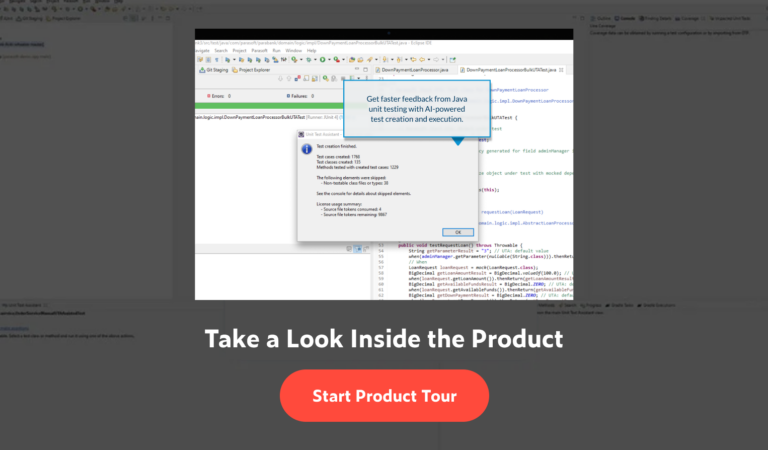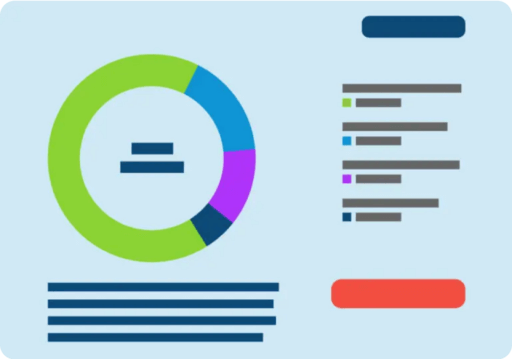Use Agentic AI to generate smarter API tests. In minutes. Learn how >>
Java Unit Testing
Test Smarter With AI That Works Like a Dev Partner
Bring AI into your process to generate and manage unit tests faster – so you can focus on development.
Java Unit Testing

Accelerate Java Testing With Built-In AI for Your IDE
Use AI to Rapidly Generate Unit Test Suites
With on-prem AI and optional integration with LLM providers, developers can quickly generate comprehensive suites to verify code. Leverage Jtest’s Unit Test Assistant (UTA)to extend generated test cases or enhance existing JUnit tests. Easily stub or mock dependencies, add regression controls and assertions, even parameterize tests — all from within the IDE.
Rapidly Reach Code Coverage Targets
Use bulk unit test creation to automatically generate a suite of unit tests to cover multiple branches through your code to rapidly reach high coverage numbers. Identify areas of untested code and get recommendations on how to address hidden coverage gaps.
Validate Code Changes With AI-Enhanced Live Unit Testing
Optimize unit testing with AI by automatically detecting and executing only the tests impacted by recent code changes – directly within the IDE. Verify modifications in real time to catch issues before committing to source control. This proactive approach helps reduce build failures and late-stage defects, giving you more confidence in every commit.
AI Helps You Handle New Features and Legacy Code With Less Test Rewriting
Parasoft Jtest enables Java teams to efficiently handle both new and legacy code with its on-prem AI-powered solution. It rapidly generates full suites of unit tests, helping teams quickly meet code coverage targets and validate functionality.
With Jtest’s AI-driven capabilities, developers can easily create, maintain, and augment unit tests, significantly reducing the time spent on manual test writing and debugging. Live unit testing provides continuous feedback in the IDE, automatically running the relevant tests impacted by code changes to catch issues early.
By automating test generation and execution, Jtest simplifies regression testing and code validation, allowing development teams to focus on delivering new features while boosting productivity and accelerating high-quality releases.
How Does It Work?
Parasoft Jtest accelerates and optimizes unit testing for Java developers by leveraging open-source frameworks like JUnit and Mockito, ensuring a seamless fit into your development environment without vendor lock-in. This flexibility makes it easier to adopt, integrate, and scale across teams.
By automatically generating JUnit test suites for uncovered lines of code, Jtest on-prem AI helps teams quickly meet code coverage targets and ensures that the tests are meaningful and maintainable, complete with mocks and assertions for easy isolation and remediation.
Developers can expand test coverage with Jtest Unit Test Assistant’s runtime analysis and IDE-based recommendations, which guide developers with insightful, actionable tips on how to extend test cases to drive higher levels of code coverage.
With AI-driven live unit testing, Jtest autonomously identifies and executes impacted unit tests in the IDE during active development, helping teams to validate code changes earlier in the development cycle. This helps users to find and address defects before they become downstream issues such as build or regression failures.
For further customization, Jtest allows teams to integrate with various LLM providers like OpenAI and Azure OpenAI to tailor and refactor tests based on natural language prompts, making it easier to address specific requirements.
By automating test generation, providing continuous feedback, and reducing the manual effort needed to create, maintain, and expand test suites, Jtest enables developers to focus more on delivering new features while ensuring code quality and reducing the risk of regressions.
Features
How can Jtest improve your team’s productivity?
Evaluate the potential time and cost savings you could experience by implementing our AI-powered Java developer productivity solution.

Benefit From the Parasoft Approach
Unlock Speed With AI Test Creation
Generate an initial suite of test cases in seconds with a single click, then use Unit Test Assistant to further build and augment the test suite. Using this approach, Parasoft customers report they can create comprehensive test suites at a minimum 2x faster than doing it manually.
Make Code Changes With Confidence
Release sooner and with confidence by evaluating and eliminating the risks associated with code changes. IDE-based live unit testing and CLI-based test impact analysis provide immediate feedback to developers about the impact of code changes during active development. Testing teams can accelerate their testing feedback loop enabling them to address issues earlier in the development cycle.
Integrate With Your Toolchain
Jtest integrates with the developer’s IDE, while leveraging open-source frameworks for test creation/execution and mocking, so it’s easy to run the tests created by Jtest in your existing continuous integration (CI) process or using standard open-source coverage engines. Because of this open platform, Jtest is easy to adopt and maintain, since users don’t have to spend time learning new languages or frameworks.
Parasoft Jtest Resources


Raise the bar on Java code quality and boost team productivity with Parasoft Jtest.





